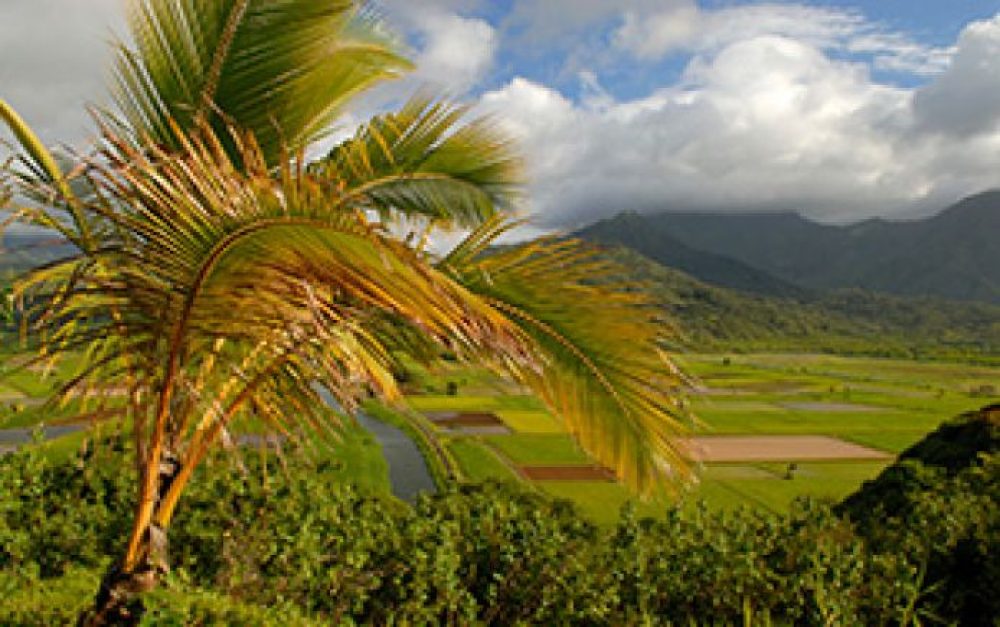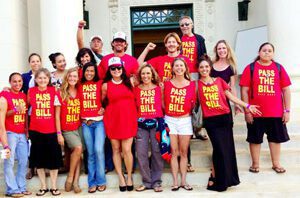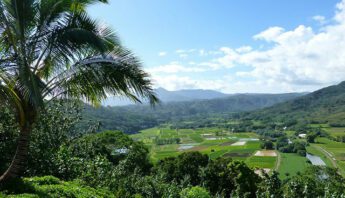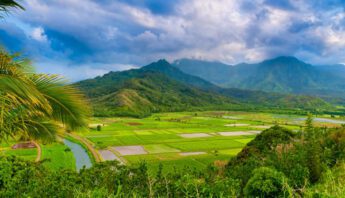The Hawai'i State Capitol in Honolulu is currently swarming with pesticide industry lobbyists. Upset that several counties are taking steps to curb corporate control of island farm land and pesticide use, Monsanto & Co. are attempting to strip authority away from local governments.
Two bills, one in the House and one in the Senate — quickly dubbed the “Hawai'i Monsanto Protection Acts” — have pesticide industry fingerprints all over them. They were introduced last week in an apparent attempt to undermine legislation recently passed (or in progress) on several islands. In response, thousands of residents marched in Honolulu yesterday. Their message? Protecting pesticide industry interests over the health and well-being of communities is unacceptable.
It comes as no surprise that the "Big 6" pesticide corporations are hyper-focused on increasing their marketshare. To this end, Dow, DuPont/Pioneer and Syngenta filed suit against Kaua'i two weeks ago for passing a law that would create greater disclosure of pesticide use on test fields for genetically engineered crops.
Lorilani Keohokalole-Torio, a mother and teacher who helped champion the bill on Kaua'i, is one of many pushing back on corporate bully tactics:
"Our communities worked so hard and played by the rules. We stepped up. We stood strong. And we, the people, won. We will not allow our state representatives to promote the financial interests of chemical companies over the health and safety of our children, our families and the land.”
Kauai’s ordinance that passed late last year, Bill 2491, established a pesticide use registry and neighbor notification about pesticide applications, as well as modest no-spray buffer zones.
And on the Big Island, recently passed legislation will limit the expansion of new genetically engineered (GE) seed operations, and the corresponding use of highly hazardous pesticides. Other counties in Hawai'i are poised to follow suit, but all of these protective policies will be undermined if the industry-sponsored state-level legislation — the "Hawai'i Monsanto Protection Act" — passes.
Next up, Maui
Late last year, the Maui County Council signaled it would take up a bill similar to Kauai’s. And althought the mayor attempted to circumvent the discussion by negotiating his own agreement with Monsanto, the largest GE seed and pesticide company in the county, residents promptly rejected that effort and asked for clear laws to govern pesticide use disclosure.
In an overflowing hearing room earlier this week, reminiscent of hearings on Kaua'i last summer and fall, residents from across the island faced off with industry front group the Hawai'i Crop Improvement Association. Tanya Marie Mailelani Naehu, a leader with the Mom Hui on Molokai — one of the islands in Maui County — shared the following with council members:
"Today I am here as a mother that is concerned about the future of her babies. My two older children attend school in the Kualapu'u and Ho'olehua areas of Moloka'i. These ahupua'a (regions) have been the center of Hawai'i's ever-changing agricultural industry. From sugar to pineapple to coffee and now bio-engineering of corn seeds and most recently soy. The amount and types of pesticides used in these fields have me worried everyday that I send my keiki (children) off to school."
No doubt the pesticide industry has learned from Kaua'i and is spending even greater resources to defeat the Maui bill. In addition to lawsuits, we expect more well-funded PR efforts and intensive lobbying in the State Capitol.
A history of undermining local rights
The latest effort by pesticide corporations to limit local authority doesn’t come as a surprise to family farmers and children’s health advocates. Kaua'i taro farmer Chis Kobayashi said:
“These preemption bills would allow large agrichemical companies to continue poisoning our lands, resources and people without the counties regulating them. Every county needs to determine the future of food and farming on their island."
In 1979, Mendocino County, California, was the first to pass a local ordinance to protect residents from the difficult-to-control phenoxy herbicides (including the much talked about 2,4-D). After pesticides drifted over three miles onto a school bus, residents demanded better protections for children. And for the following two decades, pesticide corporations fought to block these local laws, eventually losing their case in the U.S. Supreme Court.
Following that loss, industry spent the early 1990s trying to pass a series of laws at the state level — where they exerted more control through well-heeled lobbyists and political connections — to restrict local authority. States where the pesticide industry failed to pass limits on local authority include Maine, Maryland, South Dakota, Utah, Nevada, Alaska and (of course) Hawai'i.
More recently, the Big 6 have switched to undermining laws that would prohibit the growth of pesticide-promoting genetically engineered crops. Pesticide manufacturers, under the leadership of Swiss giant Syngenta, snuck a provision into Oregon’s state budget after residents in one southern Oregon county passed restrictions.
Hawai'ians say this roll-back of local authority will stop with them. Hawaii’s farmers, mothers, teachers and health professionals, among many others, are mobilizing across the islands to fight the newest threat at the state level. While they don’t have high-powered lobbyists like the chemical industry, they will hold their elected officials accountable to laws meant to protect children and spur local, sustainable farming.
Photo credit: aimintang/iStock








